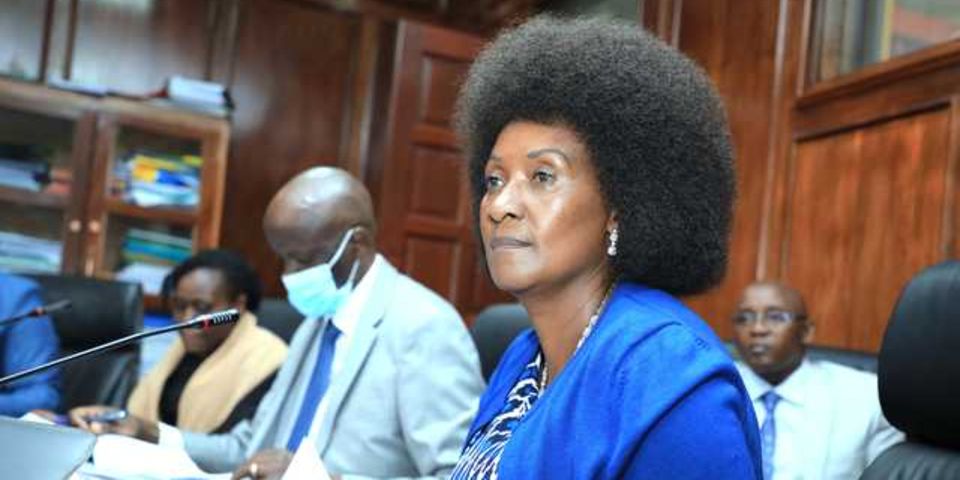Nancy Macharia, Chief Executive Officer of Kenya’s Teachers Service Commission (TSC), finds herself at the centre of a storm over alleged corruption and misuse of public funds. A petition filed by human rights defender Francis Awino in the High Court in Nairobi on February 26, 2024, has requested that the Ethics and Anti-Corruption Commission (EACC) initiate a formal investigation into Macharia’s actions at the TSC. Awino’s petition calls for a thorough criminal probe into her conduct, alleging she has breached Chapter 6 of Kenya’s Constitution concerning leadership and integrity.
Allegations of Corruption and Misuse of Funds
In his petition, Awino accuses Macharia of serious misappropriations, including inflated payments to staff, issuance of undocumented salary advances, and failure to remit billions in taxes withheld from employees. According to Awino, these actions violate ethical standards and constitute gross misconduct. He seeks court declarations that Macharia is unfit to hold any public office, as well as instructions for the EACC to initiate criminal proceedings if investigations prove her culpable.
The petition is supported by an affidavit detailing multiple instances of alleged financial impropriety, many of which were outlined in the Auditor General’s report for June 2021. This report highlighted irregularities involving Ksh 3 billion in TSC funds, allegedly misused to overpay certain staff members. Additionally, the audit discovered Ksh 2 billion in unremitted employee tax deductions. According to Awino, funds were also paid out based on records of “ghost workers” dating back to 1988.
Discrepancies in Salary Advances and Irrecoverable Loans
Another key issue in the petition concerns TSC’s handling of salary advances. Awino claims the Commission issued undocumented and unrecovered advances totalling Ksh 10.5 million. Despite clear records showing a lack of repayment, the TSC continued issuing further advances, raising concerns about poor oversight and financial control. Awino asserts that these funds are unlikely to be recovered, a claim which the TSC has yet to refute in detail.
Misallocated Funds for Non-Existent Schools and Inflated Enrollments
Awino’s petition also details the misallocation of public funds designated for educational support. The affidavit claims that Ksh 2.5 billion allocated to bridge Kenya’s teacher gap was misused, with Ksh 1 billion directed to non-existent schools during the 2018/2019 fiscal year. Additionally, in 2019, secondary schools were overpaid Ksh 105.9 million in capitation funds due to inflated student enrollment data, according to the Auditor General. Discrepancies between Ministry and school data further suggest substantial financial mismanagement.
Irregular Payments to Non-Compliant Institutions
The Auditor General’s report raised additional concerns about irregular payments to special needs education institutions. An estimated Ksh 148 million was allegedly misallocated from government allocations in October and November 2018. This sum reportedly included funds paid to institutions lacking proper registration and TSC-certified teachers. Another Ksh 8 million was allocated in excess to a low-cost boarding school due to inflated enrollments, while Ksh 1.5 million was directed to schools not listed as low-cost boarding institutions. The Auditor General’s report also highlights that some schools in genuine need did not receive the necessary funding, depriving many students of essential resources.
Macharia’s Defense and High Court’s Ruling
Macharia, in an affidavit dated November 22, 2023, responded to the allegations, asserting her commitment to upholding transparency and integrity since her initial appointment in 2015. She defended her track record, emphasizing her achievements in her role, and dismissed Awino’s claims as unsubstantiated. She underscored that the TSC’s operations have been conducted in compliance with the law, although the petition questions her direct responsibility for financial mismanagement.
The case took a new turn on October 18, when Judge I. Mugambi ruled that Awino’s petition should have first been directed to the EACC. Judge Mugambi cited the EACC’s constitutional mandate to oversee compliance with Chapter 6 on leadership and integrity, emphasizing that the High Court should be the last recourse in such cases. According to Judge Mugambi, the EACC bears the responsibility of conducting initial investigations and determining if further action, including possible prosecution, is necessary.
The Path Forward: EAC’s Role in Upholding Accountability
Judge Mugambi’s ruling highlights the EACC’s central role in addressing issues of corruption and ethical misconduct among public officials. If the EACC accepts Awino’s petition, it could lead to a formal investigation into Macharia’s conduct at the TSC. Should the EACC find substantial evidence of misconduct, it may recommend prosecution by the Director of Public Prosecutions, a move that would likely have significant implications for Macharia’s career and public confidence in the TSC.
The allegations against TSC CEO Nancy Macharia underscore the importance of transparency and accountability within Kenya’s public sector. While Macharia denies the accusations, the scale of the alleged financial mismanagement raises concerns about oversight at one of Kenya’s most vital institutions. As the EACC considers the case, the outcome will have far-reaching implications, not only for Macharia but also for the TSC’s future governance and the integrity of Kenya’s educational administration.





